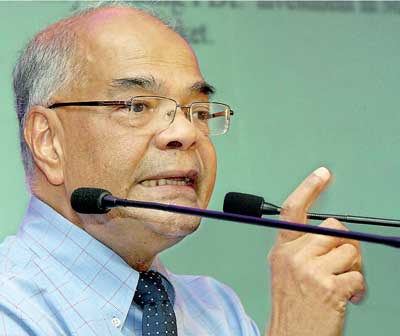Reply To:
Name - Reply Comment
By Chandeepa Wettasinghe
While giving a tacit seal of approval for the Sri Lankan government’s plan to promote export industries through economic zones, Australian National University Arndt-Corden Department of Economics, Crawford School of Public Policy Economics Prof. Prema-chandra Athukorala, who was speaking at the second Advocata Public Lecture last week, warned that the government must ensure policy consistency and ease of doing business for global production networks (GPNs) in order to attract foreign direct investments (FDIs).

The Sri Lankan government is hoping to create 45 economic zones that focus on export-oriented industrial manufacturing across the country, some of which will be managed by foreign countries or companies, in order to fulfil the government’s election promise to create one million new jobs in the country. However, so far, no action plan or legislation has been brought forward to make the plans a reality.
Services vs. manufacturing
“Some ministers say that we have to bypass manufacturing to focus on tourism and other areas. Some others talk about electronics and hi-tech manufacturing. These are not mutually exclusive things,” Prof. Athukorala said.
A popular belief is that services complement products and economies transition towards service-based economies after going through a period of industrialization. However, Sri Lanka, like a handful of other developing countries, skipped full industrialization and became a service-oriented economy.
Prof. Athukorala noted that the start of the industrialization process in the late ‘70s and early ‘80s saw FDI interest from companies such as Motorola and Harris Corporation, which if had been successful, might have led to full-scale industrialization, given the herd mentality of such investors.
“Foreign investments come in a package. It is not only capital, it comes with managerial knowhow, marketing expertise and so on. This is the reason why we need foreign investments to lead the country into global production systems,” he added.
While the leapfrogging had the advantage of saving the environment from the flipsides of industrialization—for which Sri Lanka can now avail itself of environmentally friendly technologies—it deprived most local industries of a sound technological base to remain competitive with the world as well as to provide goods at cheap prices to the domestic market.
This has led to an import-oriented economy, where, 56.6 percent of the gross domestic product (GDP) and 45.6 percent of labour participation in 2015 were through services, mainly through the retail, wholesale, food, transport and accommodation services. A dangerous trend has been spotted recently, where most of the youth entering the labour force prefer to become three-wheel drivers or join the public service, despite the availability of better private sector jobs.
However, Prof. Athukorala noted that Sri Lanka must produce goods for the export market—possibly in view of the country’s deteriorating trade deficit.
“Considering our conditions, we have to manufacture. Manufacturing also has the advantage of absorbing unskilled workers. Unlike other industries and sectors in the world, it can absorb unskilled workers and give them a job. That’s why India is promoting manufacturing,” Prof. Athukorala said. While some may argue that Sri Lanka has no unemployment problem—with 4.7 percent unemployment in 2015—and that industries such as tourism and apparel are short of labour, tourism is also known to pay extremely poorly, except for those at the top of the pyramid, while the country’s service quality in tourism has also been found lacking by international experts recently.
Prof. Athukorala noted that if Sri Lanka increases high-tech product assembly—which requires no skill—over time, the labour force can be trained to move up the value chain into manufacturing components or even into design, further increasing income to the country.
However, in order to do that, Prof. Athukorala pointed out that Sri Lanka should transition from its current buyer-driven GPNs, such as apparel manufacturing, where leading companies such as Victoria’s Secret and Nike keep local companies at arm’s length without significant capital or technological transfers, to producer-driven GPNs, where foreign multinationals set up their own operations in the country.
He said that this does not result in local companies going out of business either.
“We are not ignoring domestic companies. The lesson from other countries, including Japan and other countries in a developed or under developed stages is that they always rely on foreign capital and foreign technology. It is not going to preclude the domestic enterprises doing their work,” he said.
Prof. Athukorala added that having producer-driven GPNs in fact results in multinationals subcontracting some activities to domestic companies, which results in further technological transfers, and is clearly the most preferred form of production, since producer-driven GPNs make up 51.1 percent of global manufacturing exports, compared to 12 percent of buyer-driven GPNs.
Policy environment
However, in order to attract producer-driven GPNs, Prof. Athukorala said that the country requires consistent, liberal economic policies.
“When the Motorola manager came, he made a statement; ‘Political stability and policy certainty are the super most criteria we use in assessing investments, given if the production in one location is disturbed, the entire production network gets disturbed,’ so political and policy stability is important,” he added.
Prof. Athukorala noted that liberalization of property rights for foreign companies, a better judicial process that enforces contracts and liberalized trade and investment regimes are crucial to attract producer-driven GPNs.
Current legislation calls for a local party to be a 51 percent owner of any company if a foreign party wants to own land in Sri Lanka, while most customs tariffs are high in order to derive higher revenue and many industries are protected through mercantilist lobbying, thereby reducing competitiveness. Prof. Athukorala advised that the government to learn from the mistakes made in policymaking over the past three decades and to use the experiences to restart the liberalization process initiated in 1977, which got sidetracked due to the civil war.
“Sri Lanka’s immediate policy priority should be to restore policy emphasis on export-oriented industrialisation, set up institutional safeguards to avert further backsliding from reforms and continue with implementing the incomplete reform agenda,” he said.